The ‘Austrian’ Crystal Ball: Is the 2024 Recession Inevitable?
“For the last six recessions, a recession on average began six to 36 months after the yield curve inverted.” — Anu Gaggar, Commonwealth Financial Network
Note: I have a special announcement at the end of this Skousen CAFÉ.
In the face of rising interest rates and a tight money policy, the economy and the stock market have been surprisingly robust in 2023. Both the “top line” (GO) and “bottom line” (GDP) have shown positive growth this year. Corporate profits, housing and manufacturing construction are still holding up well.
Stocks have traditionally done well after midterm elections, and that seems to be the case in 2023. The stock market may well hit an all-time high this year.
But after that, all bets are off.
But as the chart shows, both GO and GDP are slowing down and headed into negative territory. In fact, business-to-business (B2B) spending has fallen over 9% in real terms since October. Business spending is far more important than consumer spending as a leading indicator.
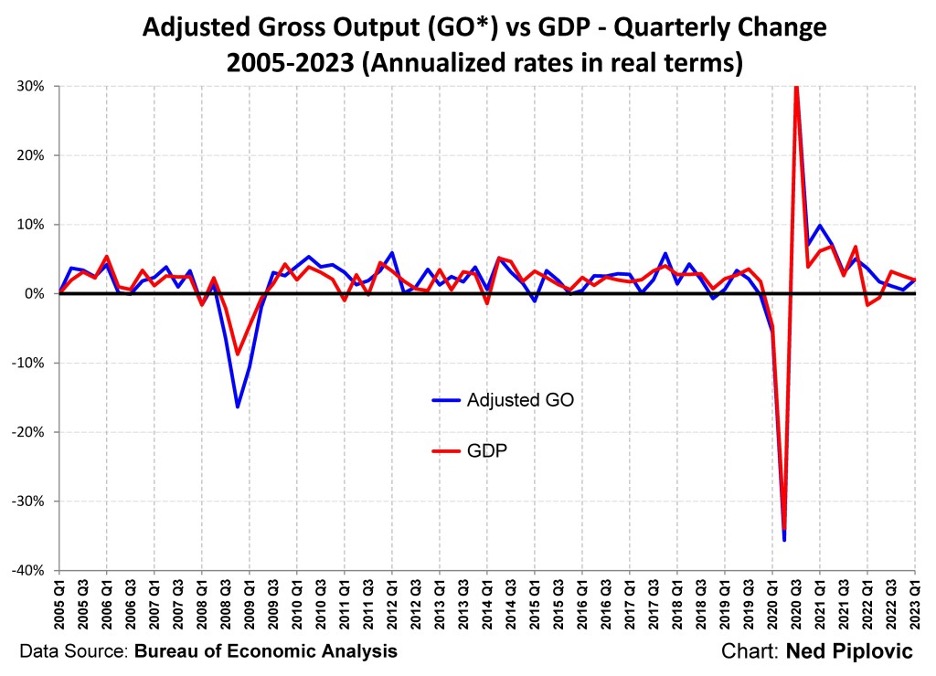
The fact is that the Conference Board’s Leading Economic Indicator Index has declined for 14 months in a row!
That’s not a good sign. (For more information, see my press release from last week: Gross Output Indicates Slow Growth, But Recession is Still Threatening — Gross Output).
How severe will the recession be? It all depends on Federal Reserve policy. Traditionally, the Fed has overreacted over the business cycle — they have been too easy during recessions, and too tight during periods of inflation.
The most popular approach by the economics profession and Wall Street is to focus on the 10-year Treasury note, adjusted for inflation, to determine how tight or loose monetary policy is. Currently, the 10-year T-note is yielding 3.8%, which is still below the inflation rate (4-5%). The Fed is determined to raise rates more.
The Structure of Interest Rates
Those of us who are students of Austrian economics use a more sophisticated measure of tight money: the money supply and the interest-rate yield curve.
For the past year, the broad-based money supply (M3) has been in actual decline, which hasn’t happened in decades. That alone suggests trouble ahead.
And then there is the inverted yield curve.
I call it the “Austrian Business Cycle Indicator.”
According to the Austrian school of Ludwig von Mises and Friedrich Hayek, the structure of interest rates matters. During recoveries and a growing economy, the yield curve is positive. Short-term interest rates such as T-bills are lower than long-term rates, such as 30-year mortgages.
However, if short-term rates are higher than long-term rates, trouble is ahead.
In fact, the yield curve became inverted late last year. Short-term rates have diverted from long-term rates, spelling trouble ahead. See the chart below.
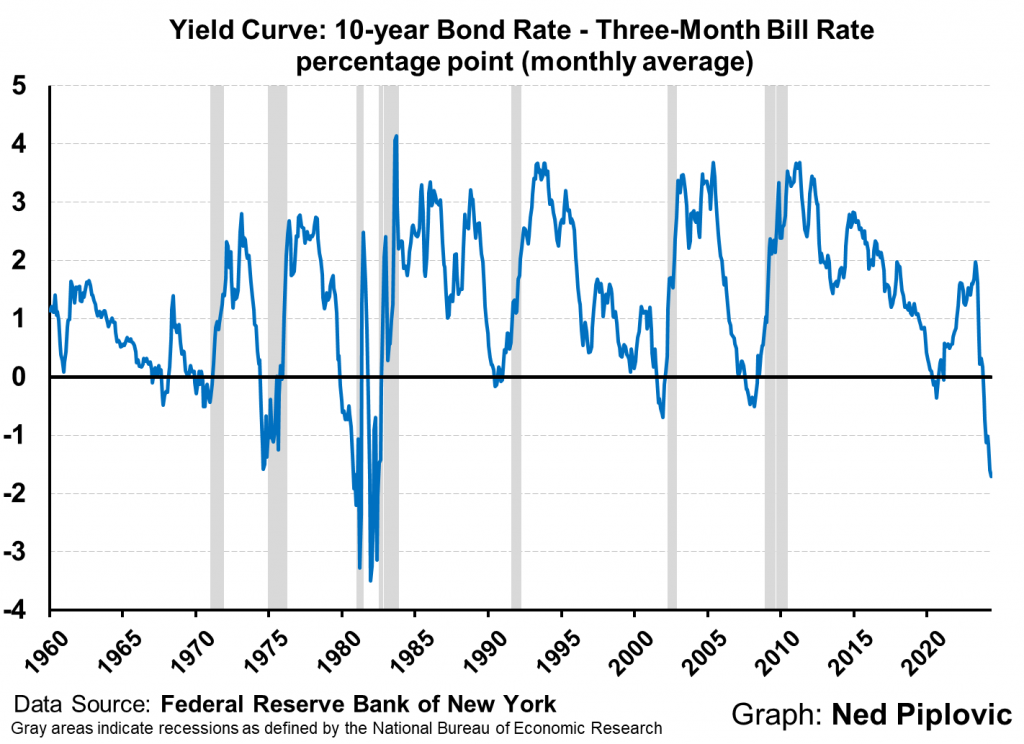
For the last six recessions, a recession on average began six to 36 months after the curve inverted.
Outlook for Stocks and the 2024 Election
The economy and the stock market are essential factors in any election. A bear market on Wall Street before the November elections is a bad sign for the incumbent party.
Most evidence points to a coming recession, and will probably occur in the presidential election year 2024.
That means a bear market on Wall Street, and the Republicans taking control of the White House and Capitol Hill in November 2024, if they have decent candidates (that’s a big if).
The Best Shortcut to Learning about ‘The Austrian Business Cycle Indicator’
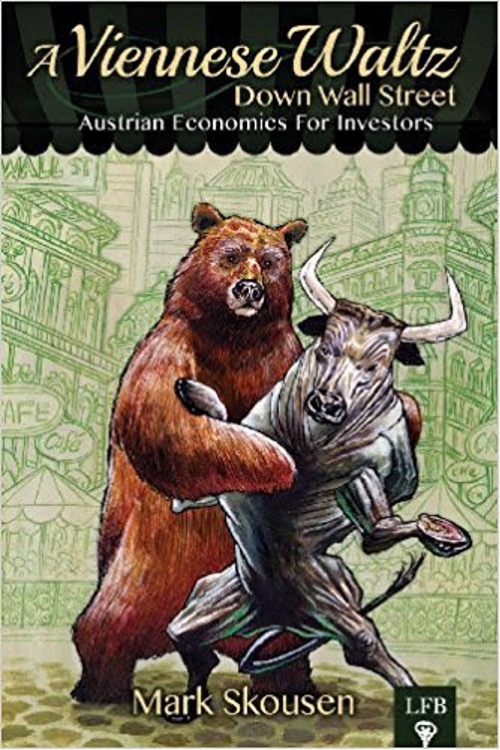
Where to learn more about Austrian economics and the predictive power of the “Austrian Business Cycle Indicator”? Look no further than my book, “A Viennese Waltz Down Wall Street: Austrian Economics for Investors.”
The book is a 256-page, quality paperback with chapters on each of the great Austrian economists, including Carl Menger, Ludwig von Mises, Friedrich Hayek, Joseph Schumpeter and Murray Rothbard.
It has chapters on the financial crisis of 2008, Keynes as a speculator, who predicted the 1929 crash, the benefits of investing in gold and silver and how to profit from the inverted yield curve.
To purchase a copy for only $20, go to www.skousenbooks.com. I autograph each copy and mail it for free if shipped inside the U.S.. I will do the same for my other books, such as “The Maxims of Wall Street” and “The Making of Modern Economics.”
As Dr. Lawrence Hayek, son of Friedrich Hayek wrote, “Skousen is the only economist I know who I can understand. He writes for the common man!” See for yourself.
Celebrating Liberty and Adam Smith
On a personal note, July always reminds me of the freedoms we enjoy. Last month, I attended a conference at Glasgow University in Scotland, celebrating the 300th birthday of Adam Smith, the founder of modern economics.
Surprisingly, most of the speakers denied that Adam Smith advocated laissez-faire capitalism. They argued that he was more of a social democrat who was a critic of big business.
In response, I noted that Adam Smith did not call his model “the system of social equality.” He did not call it “the system of social justice.” While equality and social justice were important to him, he called his model “the system of natural liberty.” To him, the highest ideal was economic freedom from the State!
And speaking of freedom, “the greatest libertarian show on Earth” will start a week from today, July 12-15, in Memphis, Tennessee, where thousands of patriots will gather to celebrate Adam Smith’s “system of natural liberty.”
Many people live lives of quiet desperation, as Henry David Thoreau warned. Not at FreedomFest!
I texted my Eagle colleagues yesterday, telling them, “Can’t wait. FreedomFest is the highlight of the year for me.”
To which Jim Woods, co-editor of Fast Money Alert, replied, “Me, too!”
Jim will be there, along with Bryan Perry and George Gilder. George is a huge fan and comes every year. He loves to dance at the Saturday night banquet.
And Alex Green, chief investment strategist of the Oxford Club, added, “It’s my favorite conference of the year.”
Steve Forbes, co-ambassador of FreedomFest, says, “I wouldn’t miss it for the world.”
Three Presidential Candidates Come to FreedomFest
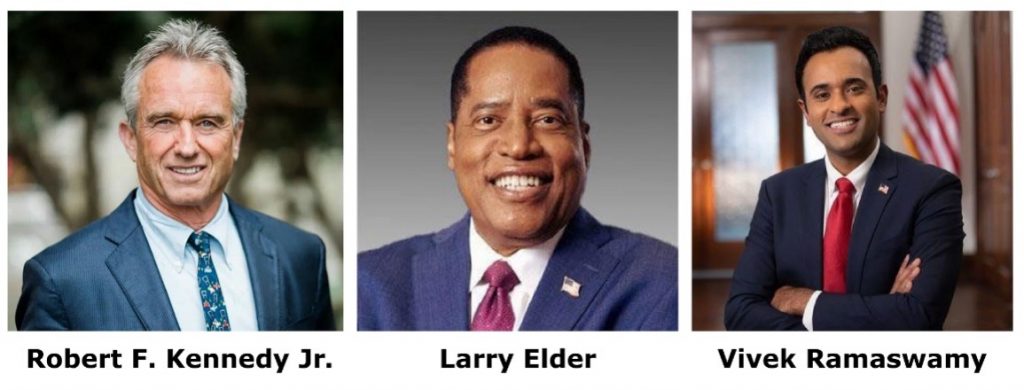
Exciting news: We have just confirmed Robert F. Kennedy Jr., who is running for President on the Democratic ticket. You won’t want to miss his first-time appearance. The Kennedy mystique continues. Business leader Vivek Ramaswamy will speak Thursday night (same as Mike Rowe), RFK Jr. will speak Saturday at noon and Larry Elder will be our keynote banquet speaker.
We will have over 300 speakers, 150 exhibitors and over 2,000 attendees. To see our entire schedule, go to www.freedomfest.com/agenda. You can also click on each individual speaker to see when they are speaking and on what topic.
Special Event for FreedomFest Investors THIS FRIDAY ONLY.
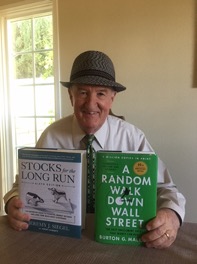
Attention, investors! For those of you who sign up for FreedomFest, you will be invited to a live, exclusive one-hour interview with the “twin titans of finance” Jeremy Siegel and Burt Malkiel, set for this Friday, July 7 at 10:30-11:30 am ET. You will also receive autographed copies of their latest editions of “Stocks for the Long Run” and “A Random Walk Down Wall Street,” which you can pick up at the Eagle booth at FreedomFest. First come, first serve. To sign up, go to www.freedomfest.com, or call Hayley at 1-855-850-3733, ext 202. There’s still time!
We’re getting a huge response to a short video of Mike Rowe, the host of the popular “Dirty Jobs” TV series. He has posted this hilarious video promoting FreedomFest. It’s created a lot of buzz. He’s caught the spirit of the conference and plans to attend all three days. “It will be a blast,” he says. Watch it here.
See you next week in Memphis. Fly there, drive there, bike there, be there!
P.S. Come join Mark and his Eagle colleagues on an incredible cruise! We set sail on Dec. 4 for 16 days, embarking on a memorable journey that combines fascinating history, vibrant culture and picturesque scenery. Enjoy seminars on the days we are cruising from one destination to another, as well as dinners with members of the Eagle team. Just some of the places we’ll visit are Mexico, Belize, Panama, Ecuador and more! Click here now for all the details.
Good investing, AEIOU,
![]()
Mark Skousen
You Nailed it!
Ben Franklin and Adam Smith Share Their Faith in America
“A virtuous and industrious people may be cheaply governed… The system of America is commerce with all and war with none.” — Ben Franklin
“Nothing can carry a nation to the highest level of opulence but peace, easy taxes and a tolerable administration of justice.” — Adam Smith
Last month, I had the opportunity to give a lecture at the Benjamin Franklin House on Craven Street in London. It’s open to the public. The next time you visit London, be sure to drop by.
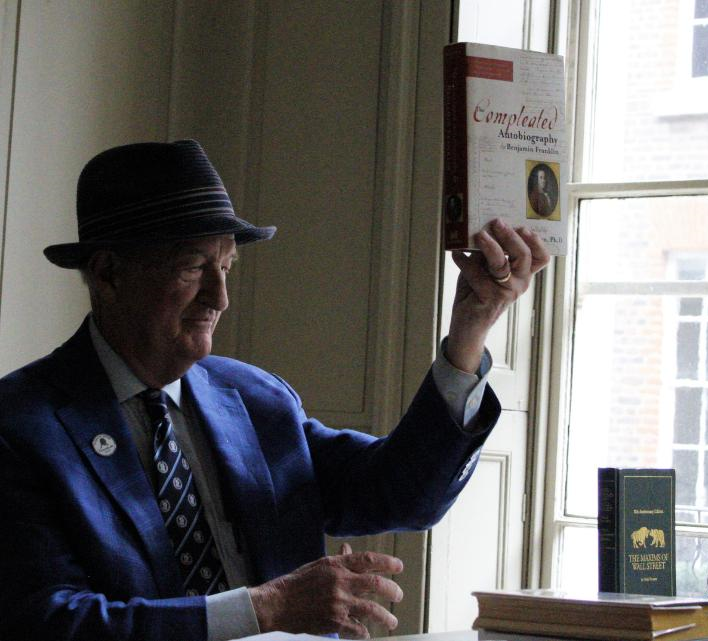
I spoke about the friendship and policy agreements between Adam Smith and Ben Franklin. Franklin was nearly 20 years his senior, but they both died in 1790. Both men supported the American Revolution and saw a bright future for America.
Here is their report:
On Tuesday, June 6, we hosted Mark Skousen for an enriching breakfast discussion on the connections between Benjamin Franklin and Adam Smith, including Benjamin Franklin’s possible influence on The Wealth of Nations.
Mr. Skousen first began by creating connections between the two influential men. They had much in common: moral philosophers who shared opinions about commercial society, free trade, economics and, of course, a love of Scotland!
Although Mark stated that letters between the two are yet to be discovered, he was keen to point out that, during the British invasion of America, a large amount of Franklin’s letters and personal belongings were destroyed. In addition, many of Adam Smith’s papers were burned after his death. As a result, historians have turned towards the work and ideas of the two prominent historical figures to look for signs of communication and influence.
Similarities
Benjamin Franklin’s ties to history are obvious; however, it is his influence on Adam Smith’s The Wealth of Nations that is more subtle.
- Benjamin Franklin allegedly told Dr. Logan of Adam Smith’s “habit of bringing chapter after chapter, as he composed it [Wealth of Nations], to himself, Dr. Price and others of the literati,” Smith often rewrote chapters or reversed his original ideals.
Both philosophers also strongly opposed the idea of mercantilism and supported the idea of free trade:
- Mark Skousen communicated Franklin’s stance on the topic of free trade through Benjamin Franklin’s popular quote “no nation was ever ruined by trade” (1774)
- Adam Smith reinforces this position by comparing nations that allow free trade to an empire in The Wealth of Nations, stating, “were all nations to follow the liberal system of free exportation and free importation, the different states into which a great continent was divided would so far resemble the different provinces of a great empire”
Those listening to Mark certainly began to understand how similar the philosophies of these two great men were. However, they did also share some differences.
Differences
They may not be major, but the two men did have different focuses when it came to fundamental factors within the economy…
- Benjamin Franklin focused on three issues within England and America:
– Industry: Productivity of the participants within the market
– Thrift: Management of money, time and energy
– Prudence can be understood as the use of wisdom or reason
- Adam Smith believed that to create the best society and economy you would need:
– Peace
– Easy Taxes
– A Tolerable Administration of Justice
Despite these differences, there is plenty of evidence that Benjamin Franklin and Adam Smith either influenced each other or were in communication, socialising with the same people and within similar organisations.
Mr. Skousen gave a truly enriching talk, and we implore you to explore Benjamin Franklin House to better understand how Franklin himself spent his time in London.
See Benjamin Franklin and The Wealth of Nations – Benjamin Franklin House.

